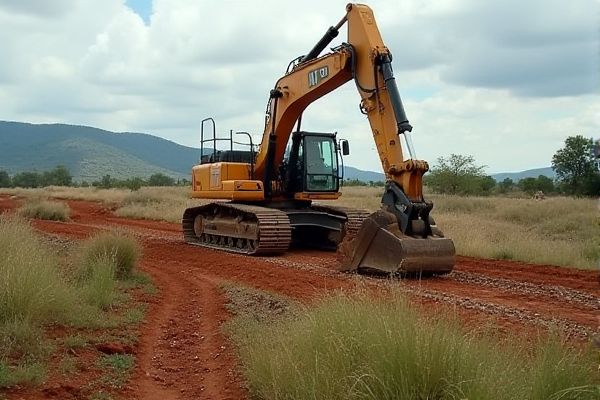
Zambia offers a growing number of job opportunities in environmental engineering, driven by the increasing focus on sustainable development and environmental protection. Key sectors hiring include mining, agriculture, and water management, where engineers work on projects related to pollution control, waste management, and resource conservation. Zambia's commitment to improving its environmental policies creates a demand for skilled professionals to assess environmental impacts and develop solutions. Networking through local organizations and industry events can enhance your chances of finding roles tailored to your expertise in this field.
Job Description
Environmental engineering jobs in Zambia often involve developing solutions to the country's pressing environmental challenges, such as soil erosion, water pollution, and waste management. Professionals in this field typically design projects that promote sustainable practices and improve public health, often collaborating with government agencies, NGOs, and communities. Skills in water quality assessment, environmental impact analysis, and renewable energy technologies are highly sought after. Job opportunities can be found in both the public and private sectors, focusing on projects that aim to enhance environmental protection and promote sustainable development in vital areas across Zambia.
Requirement
Environmental engineering jobs in Zambia often require a degree in environmental engineering or a related field, with a strong emphasis on sustainable practices. Proficiency in environmental impact assessments, water resource management, and waste management systems is highly valued. Employers typically seek candidates with relevant work experience, demonstrating practical knowledge of local environmental regulations and technologies. Excellent problem-solving skills and the ability to work in multidisciplinary teams can enhance your competitiveness in the job market.
Salary and Perks Expected
Environmental engineering jobs in Zambia typically offer competitive salaries that can vary based on experience and specialization. Entry-level positions may start around ZMW 8,000 per month, while more experienced professionals can earn salaries exceeding ZMW 15,000 monthly. In addition to salary, many employers provide perks such as health insurance, transportation allowances, and opportunities for professional development. These benefits contribute to a comprehensive compensation package that enhances job satisfaction and overall quality of life for employees in this field.
Similar Job Names
- Environmental Engineer
- Water Resource Engineer
- Air Quality Engineer
- Environmental Consultant
- Waste Management Engineer
- Environmental Scientist
- Sustainability Consultant
- Environmental Compliance Specialist
- Project Manager (Environmental Projects)
- Environmental Health and Safety Officer
- Natural Resource Manager
- Climate Change Analyst
- Soil Scientist
- Environmental Policy Analyst
- Hydrologist
Job Expectation Concept
Environmental engineering jobs in Zambia focus on addressing pressing environmental challenges, including water quality management, waste treatment, and sustainable resource use. You will encounter opportunities to work on projects that enhance infrastructure resilience while promoting eco-friendly practices. Networking with local industries and government agencies can provide valuable insights into the sector's evolving needs and regulations. Understanding the unique environmental issues facing Zambia will be crucial for effectively contributing to sustainable development initiatives in the country.
Career Advantage and Weakness
Environmental engineering jobs in Zambia offer significant career advantages, including the growing demand for sustainable practices amid industrial development and urbanization. Professionals in this field often contribute to critical projects that improve water quality, waste management, and renewable energy initiatives, making a positive impact on public health and the environment. However, these roles can also present challenges, such as limited resources and infrastructure, which may hinder the implementation of effective solutions. Emphasizing continuous learning and adaptability can help you navigate these obstacles while enhancing your skills and contributions to the sector.
Important Thing Must Know
Environmental engineering jobs in Zambia play a vital role in addressing the country's unique ecological challenges, such as water scarcity and environmental degradation. Many positions require a strong background in civil or environmental engineering, along with knowledge of local regulations and sustainability practices. Opportunities exist in both the public and private sectors, focusing on projects like waste management, water treatment, and infrastructure development. Networking with local professionals and organizations can enhance your job search, providing valuable insights and potential leads. Gaining experience through internships or volunteer work can significantly bolster your qualifications in this growing field.
Alternative Career Options
Environmental engineering graduates in Zambia can explore various career options beyond traditional roles. Opportunities exist in sustainability consulting, where you can help businesses implement eco-friendly practices and comply with environmental regulations. Water resource management positions allow for engagement in projects aimed at improving water quality and availability in communities. Additionally, roles within non-profit organizations focused on environmental conservation offer a chance to contribute to biodiversity and habitat preservation efforts.
Companies List
- Zambezi River Authority
- Copperbelt Energy Corporation
- First Quantum Minerals
- Lafarge Zambia
- Zambian Environmental Management Authority
- Ndola Lime Company
- Lusaka Water and Sewerage Company
- African Parks Network
- Zambia National Commercial Bank
- Eco-Tec Solutions
List of Ideal City
Lusaka, the capital of Zambia, offers numerous opportunities in environmental engineering due to its growing infrastructure projects and focus on sustainable development. Kitwe, a hub for mining and industry, requires environmental engineers to address challenges related to environmental impact and resource management. Ndola, with its emerging industries and commitment to green innovation, is also a key city for professionals in this field. Living in these cities can provide you with access to a network of organizations focused on environmental sustainability and regulatory compliance.
 zambia-jobs.com
zambia-jobs.com